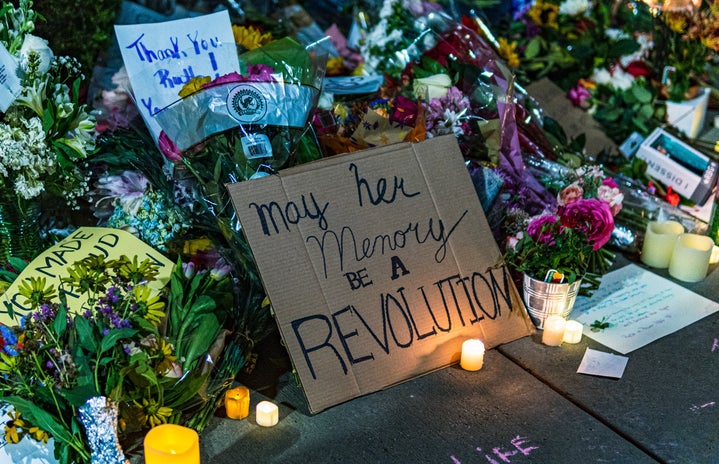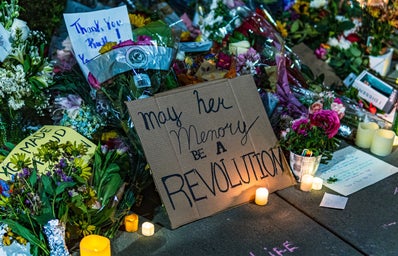I was shocked when I learned of Ruth Bader Ginsburg’s passing; it was as though I expected to feel a tangible shifting of the world when she died, as her life has so profoundly shaped American politics and personal rights. Her death similarly will change the future of the nation as we move toward a presidential election in a country divided over race and racism, a global pandemic, climate change and a myriad of other polarizing issues. Her gut-wrenching final wish was that Trump would not have the opportunity to fill her now-vacant seat on the court as he has with others, pushing the court further right and endangering the rights of the countless individuals to whose protection she dedicated her life. I can only hope that her wish will be honored, as her presence on the court as a legendary jurist has always been as the protector of the underrepresented, the marginalized, the exploited and the voiceless. I struggle to find the words to articulate the profound impact she has had on my life and the many ways in which she has always been and will be my personal hero.

I remember watching the documentary RBG in the movie theatre when it was released, and I was awed then, just as I am today, by her profound commitment to creating more equitable and fair law in the midst of great personal and professional adversity. She appeared superhuman — this person who graduated at the top of her class from Columbia Law and was the first woman to write for two major law reviews (Harvard and Columbia) did so while raising a daughter, helping her husband through his battle with cancer and attending her husband’s classes while he underwent treatment. She struggled to find a job after graduation, instead spending years in the classroom as a professor. Her eventual work with the ACLU to establish women’s rights began her legacy as a champion of gender equality at the highest level. Her history of triumphing over adversity is partly what makes her death feel so surprising; RBG fought every single day, whether for herself, for her family, or for those who were unheard. It is then all the more fitting that she fought until the end to prevent another conservative appointment to the court, demonstrating her hope in a different president come the new year. I had just told my grandfather a few days prior to vote for Biden so that Justice Ginsburg could retire — it seemed only fair to grant her a few years of peace after a lifetime of battles.

As a political science major with a particular interest in law, Ruth Bader Ginsburg’s impact on my life is significant. And as a woman, her legacy has left an invaluable mark on my experience. Her legendary dissents and often-cited cases argued before the Supreme Court appear in my coursework frequently, but she also created a world where women could pursue a career of their choosing and seek social, political and economic independence. She simultaneously raised a family with her husband, Marty, in an equal partnership, and both of them excelled in their respective legal careers. Ginsburg possessed the unique ability to command a room; when I read her Supreme Court opinions that appear in my textbooks, I find myself nodding in agreement with her. She later developed a reputation on a conservative court as a great dissenter, but regardless of majority or dissenting opinion, her arguments are compelling. One of her often-quoted pieces of wisdom is “Fight for the things you care about, but do it in a way that will lead others to join you.” She changed gender law through her argument that inequity of the sexes negatively impacted men, not simply women; her first case argued before the Supreme Court, Frontiero v. Richardson (1973), began her consistent demonstration in the nation’s highest court that gender based discrimination has no place in an equitable future. She supported the rights of the LGBTQA+ community, championed a woman’s right to choose and endorsed rights for those with disabilities.
However, her fights were without anger. She argued passionately, but not with malice. She often said that anger does not make a person more persuasive. She was patient and articulate when confronted with sexist and anti-Semitic rhetoric throughout her life, which requires unimaginable strength. I have listened to her speak on both sides of the bench for a class this semester, and her composure and eloquence never fail to awe me.
Ruth Bader Ginsburg, thank you. Thank you for establishing legal protection of equity between the sexes and demonstrating that women deserve seats at the table. Thank you for championing the rights of all people while sitting on the nation’s highest court. Thank you for continuing to fight through adversity, pain and cancer to protect the basic human rights to which you have dedicated your career. We are all eternally indebted, and I am eternally grateful, for your courage, strength, sacrifice, and passion for the law. As I have heard remarked in your honor, inspired by Jewish tradition, may your memory be a revolution.


